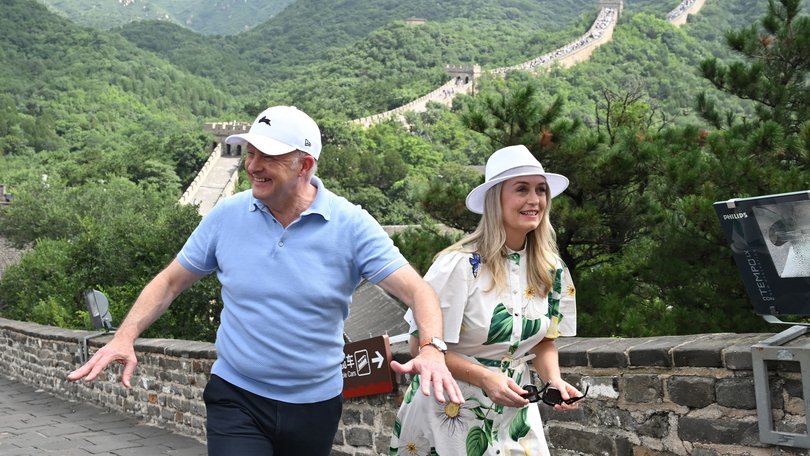Australian news and politics live: Albanese not budging on Port of Darwin despite calls to resolve issue
LIVE UPDATES: Prime Minister Anthony Albanese has been forced to address concerns raised in a state-based Chinese media outlet, as he assessed achievements from meetings with officials.

: Scroll down for the latest news and updates.
Key events
16 Jul 2025 - 01:24 PM
Big call made on childcare ‘man ban’
16 Jul 2025 - 01:22 PM
Figures make a mockery of Treasurer’s claim
16 Jul 2025 - 12:00 PM
Albanese’s Great Wall defence for Darwin Port stance
16 Jul 2025 - 11:57 AM
Failure to improve productivity costs average worker $500,000 over 25 years, says Henry
16 Jul 2025 - 11:23 AM
We warned about Budget pressure under Costello, says Henry
16 Jul 2025 - 11:20 AM
Ken Henry: It “boggles the mind” we don’t have a carbon tax
16 Jul 2025 - 10:41 AM
Albanese, Haydon take a stroll along the Great Wall of China
16 Jul 2025 - 10:31 AM
China treats Albo to Aussie classics at Great Hall event
16 Jul 2025 - 10:24 AM
Albo doubles down on Port of Darwin, despite not discussing with Li
16 Jul 2025 - 09:49 AM
Latham breaks silence on X-rated texts sent from parliament
16 Jul 2025 - 09:39 AM
Albanese reiterates Taiwan position, supports one-China policy
16 Jul 2025 - 09:36 AM
Albanese assessment of China trip so far
16 Jul 2025 - 09:32 AM
Albanese says Australia will still deal with China issues on ‘case-by-case’ basis
16 Jul 2025 - 09:27 AM
Albanese reflects on history of Australia-China relationship
16 Jul 2025 - 09:26 AM
Chinese delegation to visit Australia, PM says
16 Jul 2025 - 09:21 AM
Albanese says China meetings ‘symptomatic’ of the important Australia-China relationship
16 Jul 2025 - 09:17 AM
Albanese speaking from Great Wall of China.
16 Jul 2025 - 08:34 AM
Husic flags concerns with Segal’s antisemitism report
16 Jul 2025 - 07:16 AM
Trump warns Pharma tariffs by the end of the month
16 Jul 2025 - 06:53 AM
Butler: Murdoch’s death a chance to mourn Falconio again
16 Jul 2025 - 06:46 AM
Clare: Childcare system failed families in STI scandal
16 Jul 2025 - 06:20 AM
LATIKA BOURKE: Elbridge Colby is trying to use Trump’s MAGA tough talk strategy to push Australia
16 Jul 2025 - 06:16 AM
PM to visit Great Wall as Australia and China sign trade deals
Kimberley Braddish is reporting live.
Trump warns Pharma tariffs by the end of the month
US President Donald Trump has signalled he is preparing to announce tariffs of up to 200 per cent on imported pharmaceuticals, with official details expected before the end of July.
Mr Trump has said the tariffs will start low, giving pharmaceutical companies about a year to adapt before the rates rise sharply.
“The pharmaceuticals will be tariffed probably at the end of the month,” Mr Trump said on Tuesday evening US time, before boarding Air Force One in Maryland.
“We’re going to start off with a low tariff and give the pharmaceutical companies a year or so to build, then we’re going to make it a really high tariff.”
“There’s two ways to do it: you make money or you have them move here so they don’t have to pay the tariffs.”
“Pharmaceuticals are moving back to America where they should be.”
Butler: Murdoch’s death a chance to mourn Falconio again
Health Minister Mark Butler has responded to the death of Bradley John Murdoch — the convicted murderer of British backpacker Peter Falconio, saying it offers another chance to grieve with the young victim’s family.
Speaking on ABC News Breakfast, Mr Butler said there was “not much reason” to mourn Murdoch, who died from throat cancer in the Alice Springs Hospital palliative care unit this week.
“It’s another opportunity to mourn the loss of a young life, Peter Falconio, and to grieve with a family that still doesn’t have that closure, still don’t know where the remains of their loved one has laid for so many years now,” he said.
“Just an awful tragedy, a young life snuffed out at that age.”
Murdoch was serving a life sentence for the 2001 murder of Falconio, who was shot on a remote stretch of the Stuart Highway near Barrow Creek. His partner Joanne Lees managed to escape and raise the alarm, but Falconio’s body has never been found.
Clare: Childcare system failed families in STI scandal
Thousands of families across Australia have been told their children must undergo blood and urine tests for sexually transmitted infections, in one of the nation’s biggest childcare safety scandals.
The tests are part of a widening investigation into former childcare worker Joshua Bown, who has been charged with child abuse offences in Victoria and previously investigated in Queensland.
Education Minister Jason Clare appeared on Sunrise this morning, saying the current system had failed families and urgent reforms were needed.
“More parents are put through the ringer. All the fear and anxiety that their kids might be sick and the trauma that kids have to go through. It’s not just blood tests, it’s urine tests as well,” Mr Clare said.
“The company should have picked this up in the first place… This highlights an example of why you need a database or a register so you know where all childcare workers are and where they’re moving from centre to centre.”
Mr Clare confirmed new legislation would be introduced to prevent childcare centres that fail safety standards from receiving government funding and said systems must be in place so authorities can quickly identify where staff have worked:
“You should be able to press a button and know exactly where he was and when he was working.”
LATIKA BOURKE: Elbridge Colby is trying to use Trump’s MAGA tough talk strategy to push Australia
Elbridge Colby, the man reviewing AUKUS inside the Pentagon, thinks he can replicate MAGA’s success in scolding, berating and bullying Europe into lifting defence spending in Australia and the Indo-Pacific.
But his cut-and-paste approach may not only fail, but backfire.
This is because his hectoring approach fails to recalibrate for the important ways that Europe differs from Asia.
Mr Colby’s demands that Indo-Pacific allies raise defence spending are legitimate in Australia’s case.
But he is far from the first person to raise the issue.
PM to visit Great Wall as Australia and China sign trade deals
Today marks a historic highlight in Prime Minister Anthony Albanese’s visit to China, with a walk along the Great Wall planned before he heads to Chengdu.
This follows a landmark series of meetings in Beijing’s Great Hall with President Xi Jinping, Chairman Zhao Leji, and Premier Li Qiang, where Albanese emphasised Australia’s ongoing commitment to engaging China in areas of mutual benefit, while not shying away from disagreement when needed.
The diplomatic talks have already yielded tangible results for both nations. On Tuesday, six new agreements were signed, including one that will soon see sweet, tangy Chinese jujubes available on Australian shelves—while, for the first time, apples from mainland Australia will be exported to China.
“In recent years, co-operation has encountered headwinds,” Chinese Premier Li admitted as the two countries move to deepen trade cooperation amid broader global uncertainty.
Albanese echoed these sentiments, stating, “My government believes unequivocally in free and fair trade as a driver of global growth, and I know the discussions that we’ve had today have been very constructive”.
